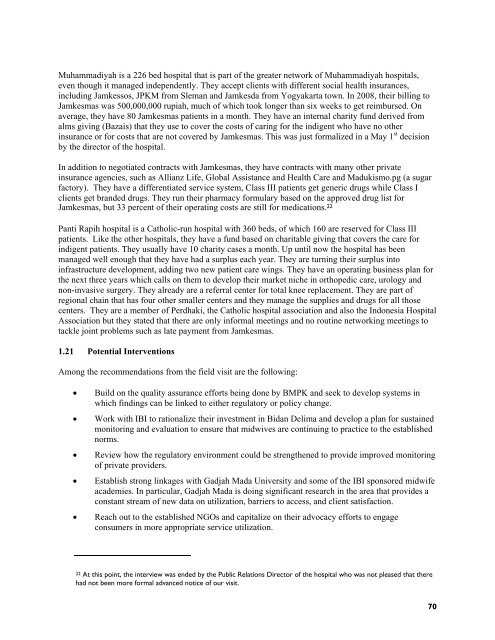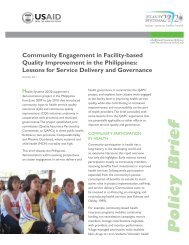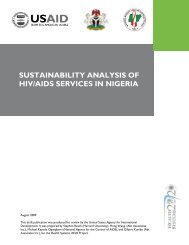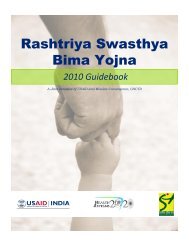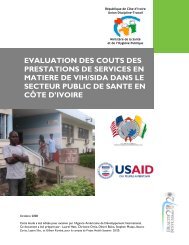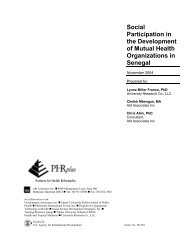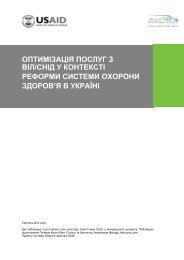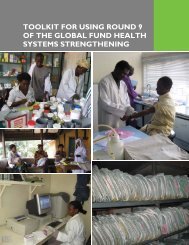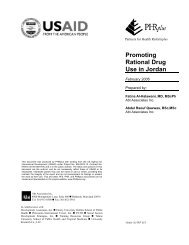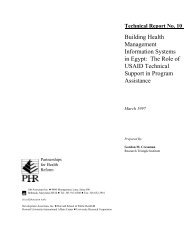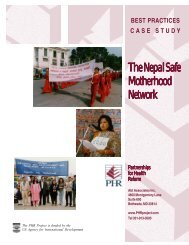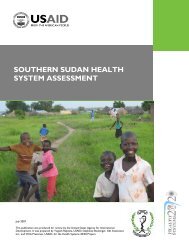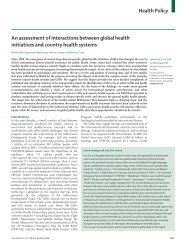PRIVATE SECTOR HEALTH CARE IN INDONESIA - Health Systems ...
PRIVATE SECTOR HEALTH CARE IN INDONESIA - Health Systems ...
PRIVATE SECTOR HEALTH CARE IN INDONESIA - Health Systems ...
- No tags were found...
You also want an ePaper? Increase the reach of your titles
YUMPU automatically turns print PDFs into web optimized ePapers that Google loves.
Muhammadiyah is a 226 bed hospital that is part of the greater network of Muhammadiyah hospitals,even though it managed independently. They accept clients with different social health insurances,including Jamkessos, JPKM from Sleman and Jamkesda from Yogyakarta town. In 2008, their billing toJamkesmas was 500,000,000 rupiah, much of which took longer than six weeks to get reimbursed. Onaverage, they have 80 Jamkesmas patients in a month. They have an internal charity fund derived fromalms giving (Bazais) that they use to cover the costs of caring for the indigent who have no otherinsurance or for costs that are not covered by Jamkesmas. This was just formalized in a May 1 st decisionby the director of the hospital.In addition to negotiated contracts with Jamkesmas, they have contracts with many other privateinsurance agencies, such as Allianz Life, Global Assistance and <strong>Health</strong> Care and Madukismo.pg (a sugarfactory). They have a differentiated service system, Class III patients get generic drugs while Class Iclients get branded drugs. They run their pharmacy formulary based on the approved drug list forJamkesmas, but 33 percent of their operating costs are still for medications. 22Panti Rapih hospital is a Catholic-run hospital with 360 beds, of which 160 are reserved for Class IIIpatients. Like the other hospitals, they have a fund based on charitable giving that covers the care forindigent patients. They usually have 10 charity cases a month. Up until now the hospital has beenmanaged well enough that they have had a surplus each year. They are turning their surplus intoinfrastructure development, adding two new patient care wings. They have an operating business plan forthe next three years which calls on them to develop their market niche in orthopedic care, urology andnon-invasive surgery. They already are a referral center for total knee replacement. They are part ofregional chain that has four other smaller centers and they manage the supplies and drugs for all thosecenters. They are a member of Perdhaki, the Catholic hospital association and also the Indonesia HospitalAssociation but they stated that there are only informal meetings and no routine networking meetings totackle joint problems such as late payment from Jamkesmas.1.21 Potential InterventionsAmong the recommendations from the field visit are the following:• Build on the quality assurance efforts being done by BMPK and seek to develop systems inwhich findings can be linked to either regulatory or policy change.• Work with IBI to rationalize their investment in Bidan Delima and develop a plan for sustainedmonitoring and evaluation to ensure that midwives are continuing to practice to the establishednorms.• Review how the regulatory environment could be strengthened to provide improved monitoringof private providers.• Establish strong linkages with Gadjah Mada University and some of the IBI sponsored midwifeacademies. In particular, Gadjah Mada is doing significant research in the area that provides aconstant stream of new data on utilization, barriers to access, and client satisfaction.• Reach out to the established NGOs and capitalize on their advocacy efforts to engageconsumers in more appropriate service utilization.22 At this point, the interview was ended by the Public Relations Director of the hospital who was not pleased that therehad not been more formal advanced notice of our visit.70


